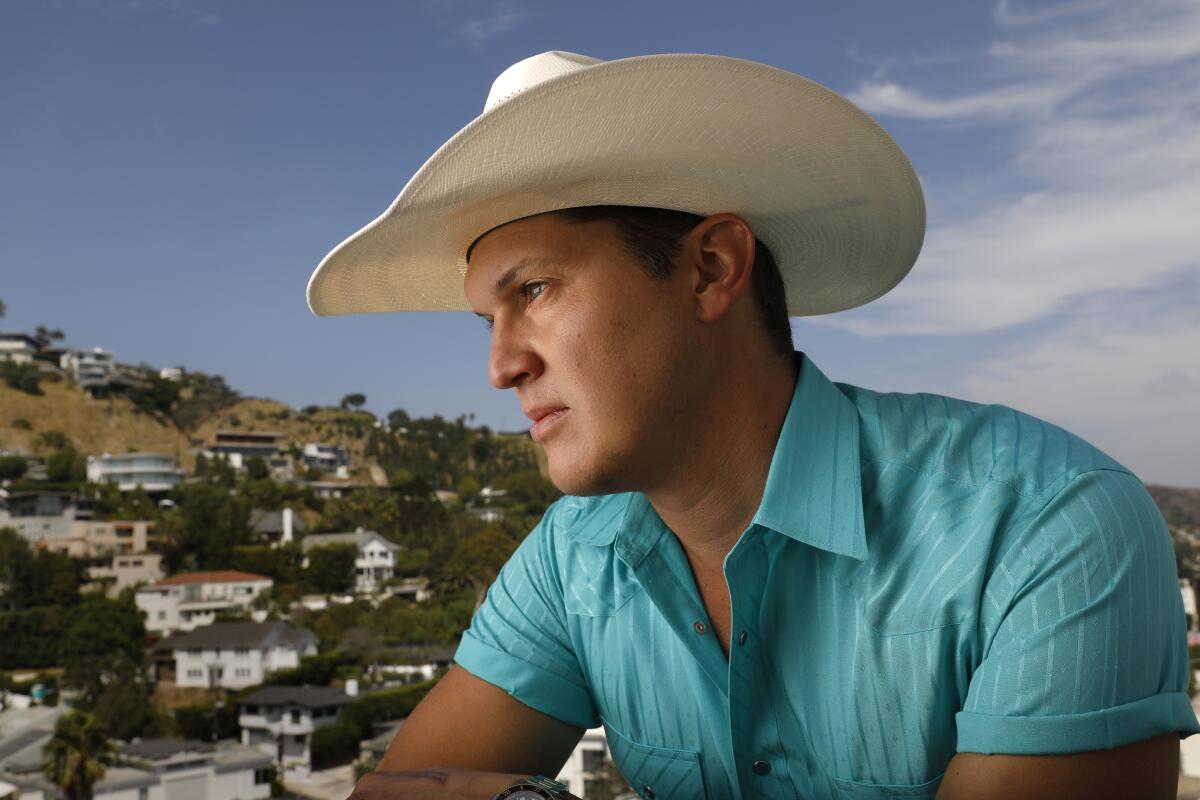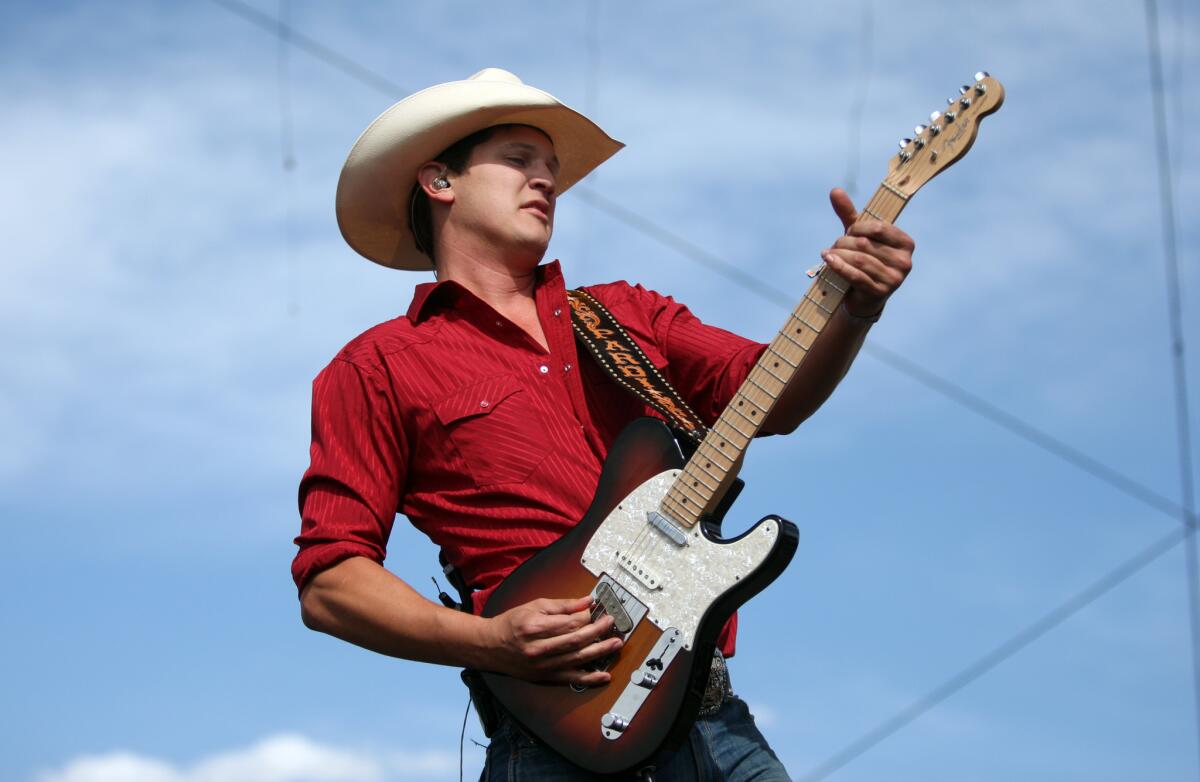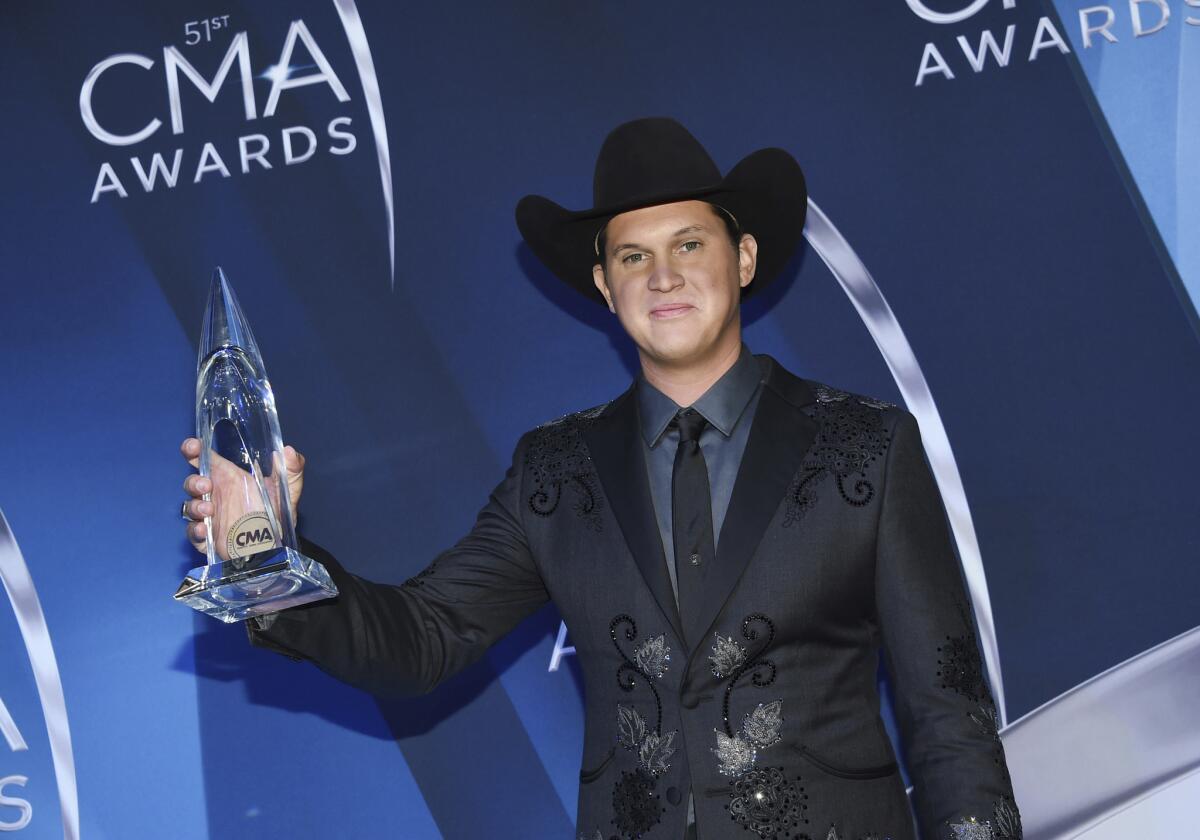How Jon Pardi updates big-hat country for the ‘Old Town Road’ generation

- Share via
WHEATLAND, Calif. — Jon Pardi figured some folks from his past were likely to turn up when he performed recently in this dusty agricultural city not far from Sacramento.
Indeed, no fewer than 50 of them — family members, old high-school pals, guys he used to work construction with — chartered a bus from nearby Dixon, where the country singer grew up, to come see him open for Dierks Bentley at the Toyota Amphitheatre.
What he hadn’t expected to find was the young woman standing right up front during his set waving a sign that read, “I crashed your sister’s wedding.”
A credible claim? “Oh, she had pictures to prove it,” Pardi said with a laugh after the concert, though he seemed less than shocked to learn that a stranger had sneaked inside the private ceremony. “I guess she got worked up when she heard I was there.” He shrugged.
“Small town, you know.”
With his superb — and superbly timed — new album, Pardi stands to excite listeners from well beyond his native Northern California. On “Heartache Medication,” due Friday, the 34-year-old singer makes country music the way it used to be made, before synths and drum loops replaced fiddles and pedal steel, andas that title suggests, the clever, vividly phrased songs are all about love, except when they’re about the drinking one does after the love goes wrong.

Pardi’s third major-label release since he moved to Nashville from Dixon over a decade ago, “Heartache Medication” arrives amid a widespread resurgence of affection for country from the 1990s, when the genre was ruled by showy but tradition-minded stars such as Garth Brooks, who headlined Stagecoach last year, and Alan Jackson, whose “Chattahoochee” has been covered lately by Chris Young and Walker Hayes. (In 2018, Hayes even scored a minor hit with an original called “90’s Country.”)
Yet Pardi isn’t just a good-looking throwback in a crisp cowboy hat. Though he can get boots scooting like Brooks & Dunn or George Strait back in the day, Pardi puts across a punky energy in his yelping, slightly coarse-edged vocals that feels modern and raw. In his songs, women often have more to do than ride around in the passenger seat of his truck.
He’s also a big fan of “Old Town Road,” Lil Nas X’s controversial country-trap smash that revived age-old debates this summer about what is and isn’t country.
“I was roping with some buddies in Texas when that song came out, and man, we had the horses loaded up and they really were in the back,” he said. “For me, it was a no-brainer. I fell in love with it.”
Respectful but not reactionary, Pardi’s evolved approach to country’s heritage sets him apart at a moment when Nashville seems to want to divide itself into the trailblazers and the preservationists.
“I’ve always admired how Jon sounds like his own man,” said Eric Church, the country A-lister who co-wrote the album’s “Don’t Blame It on Whiskey” — a tender duet between Pardi and Lauren Alaina — with another famous supporter, Miranda Lambert. “I’m proud he cut my song.”

Onstage at the amphitheater in Wheatland, where he remembered watching Jackson from the cheap seats as a kid, Pardi wore a checkerboard button-down like Brooks’ on the cover of “The Chase” as he led his band through hard-driving renditions of the new album’s title track and “Head Over Boots,” from 2016’s platinum-certified “California Sunrise.” Near the end of the show he took a minute to say how glad he was to be in his home state, then got 20-somethings and old-timers alike to wave their illuminated cellphones as he sang Strait’s vintage tearjerker “Marina del Rey.”
Asked what he thinks has spurred the ’90s obsession, Pardi — a winner of best new artist awards from both the Country Music Assn. and the Academy of Country Music — mused that perhaps people miss the variety of songs from that era. “If you listen to country radio now, there’s a lot of stuff that sounds the same,” he said as he sat backstage nursing a vodka-soda. He meant the endless parade of slick, lightly hip-hop-inflected hits by the many ballcap-wearing dudes for whom Luke Bryan looms as large as George Jones. Yet he was quick to clarify that country, with its complicated ideas about down-home authenticity, is always doubling back on itself.
“When it gets to the point where everything’s kind of running into each other, that’s usually when an older type of thing comes back around,” he said, referring to breakthroughs by Waylon Jennings and Dwight Yoakam after the music got too polished in the ’70s and ’80s, respectively.

Pardi made clear too that, as an old millennial, hip-hop was an important part of his upbringing. “Dr. Dre, Snoop Dogg, 50 Cent — shoot, that was the heyday,” he said before busting out the indelible hook from “In Da Club.” (On his tour bus recently he watched Netflix’s documentary about Travis Scott, whose concert theatrics led Pardi to call him “the Garth Brooks of rap.”)
Still, it was the classic country music his grandmother exposed him to that set him on his path. “She had this karaoke machine, and she’d play tracks and we’d sing along,” he recalled. Pardi learned to play guitar at age 9 and was writing songs by 12; after high school he gave college a try before moving to Chico and forming a band that didn’t last. Once in Nashville — where he lives today on a 15-acre spread with room to park the bus — it took him a while to get things going, he said, but eventually he landed a publishing deal and later signed a contract with Capitol Nashville. His debut album, “Write You a Song,” came out in 2014 to warm reviews if minimal radio interest.
UMG Nashville President Cindy Mabe said programmers pushed back initially on the roughness of Pardi’s voice as compared to smoothies like Blake Shelton and Thomas Rhett. “He’s a honky-tonker,” Mabe said in a what-do-you-want-from-me tone. Yet they came around for “Head Over Boots,” which topped Billboard’s country airplay chart on its way to selling 2 million downloads.
For “Heartache Medication,” which Mabe expects will turn Pardi into an arena act, the singer wanted to cover a little more ground than he has previously while sticking to the neo-traditionalist vibe he’s carefully established. “Tequila Little Time” deploys some stupid-brilliant wordplay as mariachi-style horns nod to the singer’s California roots. And “Don’t Blame It on Whiskey,” the first male-female duet he’s recorded, is slower than his rowdier older tunes — not quite a ballad, by his reckoning, but a song set at “the perfect dancing tempo for that guy who only knows how to hold on to a girl and spin in a circle.”

The album opens with the sly “Old Hat,” which baits you into expecting the kind of get-off-my-lawn-ism that Pardi avoids in real life. “These days they call you crazy / If you hold the door for a lady,” he sings in the song, one of several on the record he didn’t write. (It’s by a team of Nashville pros headed by Jeff Hyde.) But “Old Hat” goes on to thread a very tricky needle; it’s nostalgic for the past yet clear-eyed about the necessity of progress.
“We almost didn’t record it,” Pardi said, adding, “trust me — there’s a lot of old-fashioned things I don’t want to come back.” His girlfriend, Summer Duncan (with whom he line dances in the video for “Heartache Medication”), changed his mind about the song.
“She always says, ‘Man, I went on so many’ crummy ‘dates before you,’” he said, laughing as he quoted a saltier word. “So to her this was just asking guys to be a little more polite — to look somebody in the eye and to not lie.
“It’s grandpa wisdom, you know? Simple things we could use a bit more of in 2019.”
More to Read
The biggest entertainment stories
Get our big stories about Hollywood, film, television, music, arts, culture and more right in your inbox as soon as they publish.
You may occasionally receive promotional content from the Los Angeles Times.











